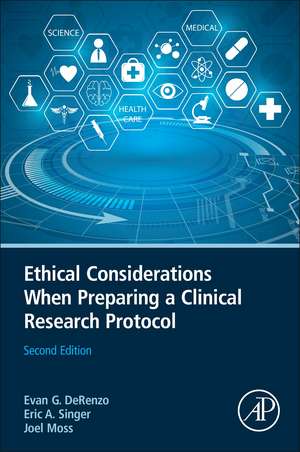Ethical Considerations When Preparing a Clinical Research Protocol
Autor Evan DeRenzo, Eric A. Singer, Joel Mossen Limba Engleză Paperback – 10 iun 2020
- Walks investigators and trainees through the identification of the ethical aspects of each section of a clinical research protocol
- Includes case histories that illustrate key points
- Contains information on conducting clinical research within the pharmaceutical industry
- Includes internet resources and worldwide web addresses for important research ethics documents and regulations
- Contains a chapter on Study Design and Methodology that is purposely expanded to explicitly address biostatistical considerations
Preț: 223.59 lei
Preț vechi: 267.38 lei
-16% Nou
Puncte Express: 335
Preț estimativ în valută:
42.78€ • 44.78$ • 35.61£
42.78€ • 44.78$ • 35.61£
Carte tipărită la comandă
Livrare economică 24 martie-07 aprilie
Livrare express 21-27 februarie pentru 80.73 lei
Preluare comenzi: 021 569.72.76
Specificații
ISBN-13: 9780123869357
ISBN-10: 0123869358
Pagini: 370
Dimensiuni: 152 x 229 x 24 mm
Greutate: 0.49 kg
Ediția:2
Editura: ELSEVIER SCIENCE
ISBN-10: 0123869358
Pagini: 370
Dimensiuni: 152 x 229 x 24 mm
Greutate: 0.49 kg
Ediția:2
Editura: ELSEVIER SCIENCE
Public țintă
Basic scientists collaborating in clinical trials, physician investigators, clinical research fellows, research nurse coordinators, residents, and anyone who wants a better understanding of the clinical trials process.Cuprins
1. What You Need To Know About Research Ethics Before Deciding on What You Want To Study 2. Designing a Clinical Research Study 3. Writing Consent and Assent Documents 4. Getting the Protocol Approved 5. Conducting the Study; Special Populations 6. Ethical Considerations in Genetics Research 7. Ethical Considerations in Use of Tissue for Laboratory Investigations 8. Ethical Considerations in Use of Stored Tissue9. Confidentiality Issues 10. Research in Emergency Medicine 11. Reporting of Adverse Events 12. FDA 13. Radiation Safety Issues 14. Participation of Subjects in Multi-Site Trials15. Participation of Subjects in Multiple Studies16. Conduct of Pharmaceutical Industry Research 17. Case Histories, Learning from Experience
Recenzii
"It has been over 10 years since the initial edition of this text. This second edition serves as a more updated, comprehensive, cursory reference toward the ethical considerations necessary for developing and implementing clinical research studies. The publication's most important message is delivered in section A.2.3., yet, it is a thread throughout the book: knowing the basic ethical principles as well as regulations relevant to clinical research are not enough; rather, it takes mentoring, discussing, and resolving constructs and concerns through a team approach, which may be raised and delivered by a clinical research protocol. My criticism of the book is that there is an unsettling lack of attention to the clinical research ethical requirement of "respect for enrolled subjects" as originally published by Emanuel et al. in 2000. The application of this principle is to be realized in the study monitoring processes that maximize benefit and minimize risk; those processes being commensurate with the level of risk offered by the study design, intervention, and/or population and environment in which the protocol will be conducted, as well as the personnel by which it will be conducted. Of particular note is that this monitoring may (or may not) call for independent monitoring outside of the study team as well as Institutional Review Board (IRB). The material of the text appears to be limited to the concept of a Data and Safety Monitoring Board, which is only briefly mentioned and, as only a recent phenomenon, not so! While there are other publications that more fully address the ethical principle of "respect for enrolled subjects," it would be beneficial for this book to expound on this ethical principle and how it can be achieved during study conduct, as the book presents other ethical principle that are primarily applied during protocol development and initiation." --Doody
Review of the previous edition:"This book will be a very useful text and reference source for students and trainees at all levels, as well as for seasoned investigators and RERB members. The continuing proliferation of formal, degree-granting masters and doctoral training programs in clinical investigation at academic centers across the country underscores the need for a book like this. These programs, and the growing acceptance and recognition of professional certification programs for clinical research professionals, are indicators that the expectations we place on investigators are greater than they were just a few years ago. Recognition that good science and good ethics are inextricably bound together in clinical research is today’s reality, and this book gives real insight into why and how." --JAMA, February 2006
Review of the previous edition:"This book will be a very useful text and reference source for students and trainees at all levels, as well as for seasoned investigators and RERB members. The continuing proliferation of formal, degree-granting masters and doctoral training programs in clinical investigation at academic centers across the country underscores the need for a book like this. These programs, and the growing acceptance and recognition of professional certification programs for clinical research professionals, are indicators that the expectations we place on investigators are greater than they were just a few years ago. Recognition that good science and good ethics are inextricably bound together in clinical research is today’s reality, and this book gives real insight into why and how." --JAMA, February 2006











